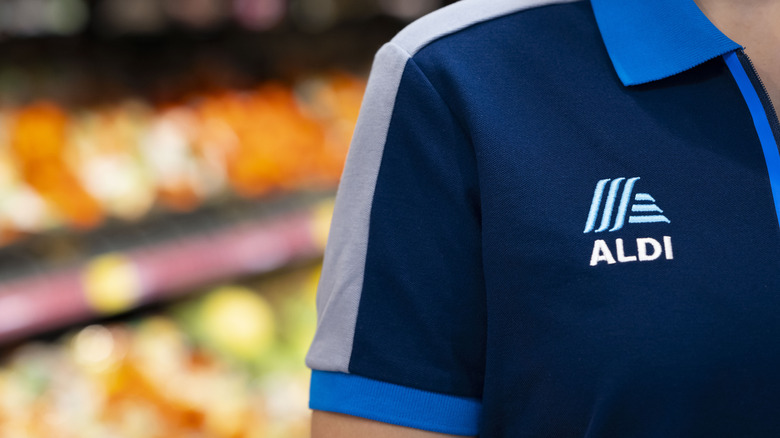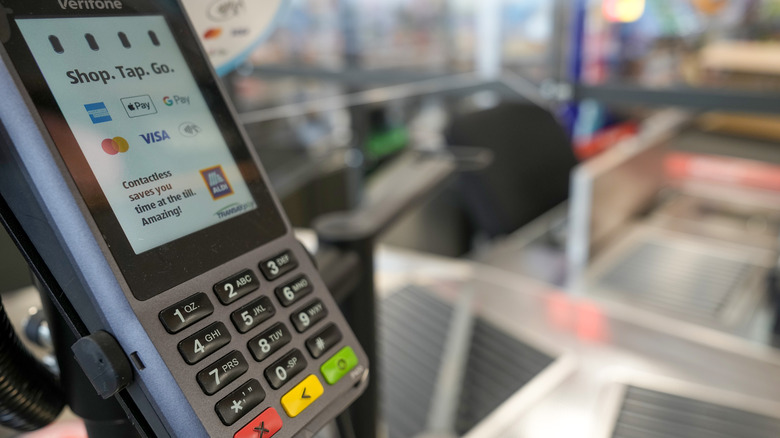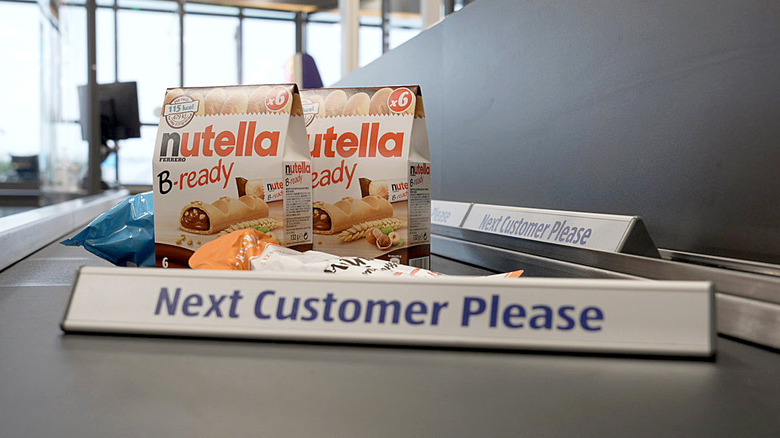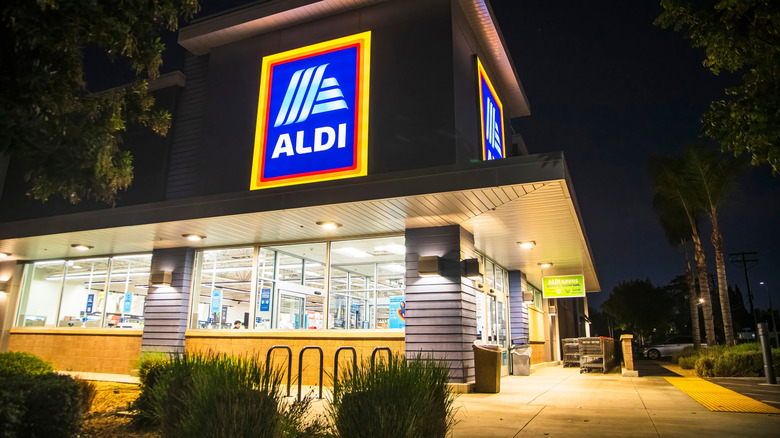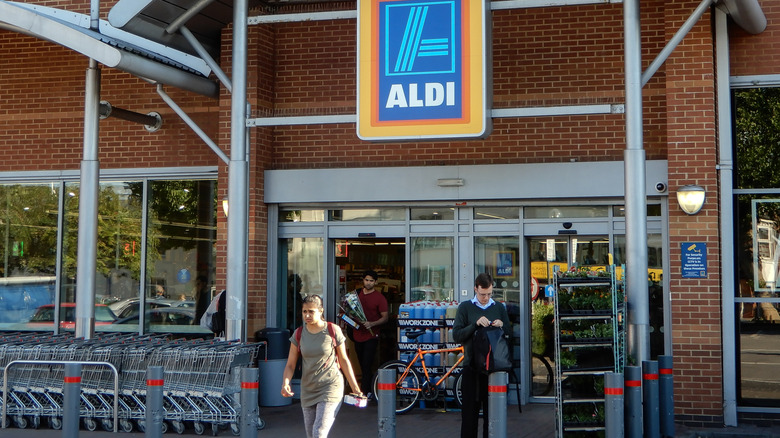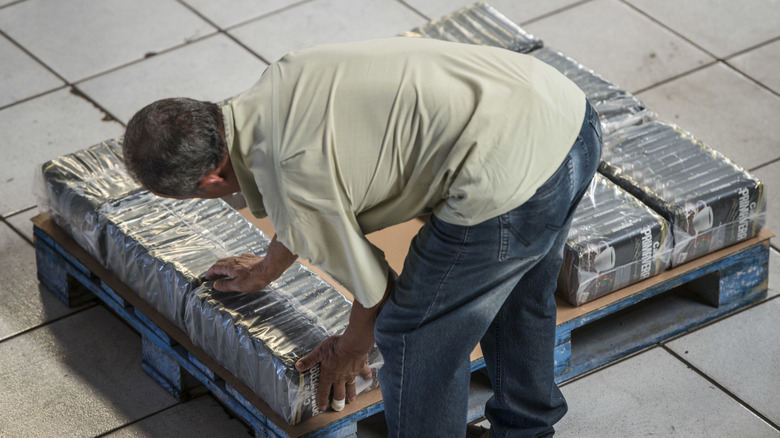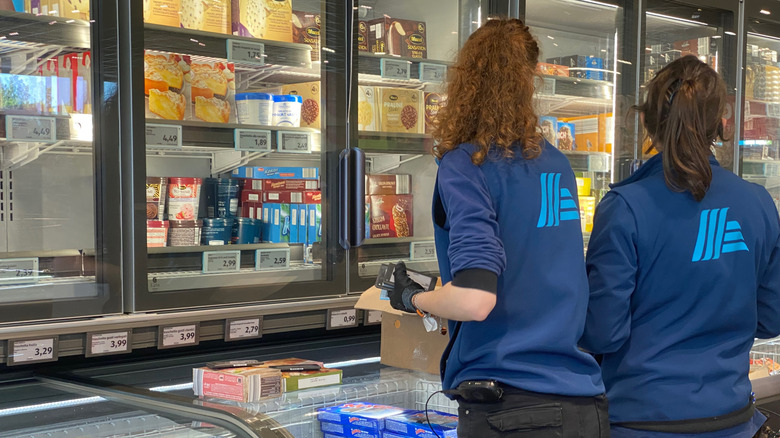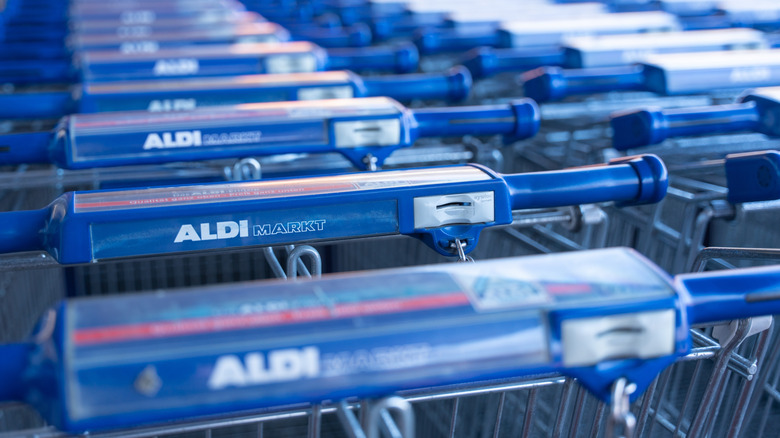Unusual Rules Aldi Employees Have To Follow
Aldi is known the world over for its relentless pursuit of efficiency and cost-cutting, which it passes on to customers with lower prices. To maintain its profit margins, the no-frills grocery chain hires fewer employees per store and trains them to focus on essential tasks. You won't see Aldi workers carefully stocking displays, corralling shopping carts, or even answering phone calls from customers. For Aldi, time is money, and the store enforces some unusual rules to ensure its employees make the most of every moment they're on the clock.
Aldi workers have revealed what it's like to work for the chain, saying that the job can be stressful and backbreaking. A smaller staff means every employee must know how to do multiple tasks. That's a far cry from your typical supermarket with dedicated employees stocking shelves, working the deli counter (which Aldi doesn't have), and even greeting shoppers. At least Aldi has a reputation for paying its workers well. Perks include company-matching 401(k) plans, decent paid time off and health insurance, and annual raises. To reap these benefits, however, employees must abide by some strange rules designed to keep them as productive as possible. As weird as the rules are, they seem to work — Aldi was ranked the top grocery store for value, according to a 2023 consumer survey report by Market Force Information.
Aldi cashiers must remain seated while working the register
In the retail world, most bosses expect workers to stand while they do their jobs. It's a sign that the employee is engaged and ready to serve customers. Aldi not only rejects this conventional wisdom, but it also mandates that cashiers must sit behind the register. According to the company, it's easier and faster to check out products when employees are in a seated position. You probably won't argue otherwise if you've ever seen an Aldi cashier blaze through a customer's groceries.
The company streamlines productivity even more by designing its checkout lanes so the cashier can easily pull the customer's shopping cart next to them. Cashiers are then seated in the perfect spot to scan and place items in the customer's cart efficiently. Aldi's performance goal for cashiers is reportedly to ring up 1,200 products an hour, which helps the store accommodate more business.
Aldi isn't concerned with how things look — case in point is the produce section, where Aldi sometimes gets a bad rap. If something is faster and more efficient, Aldi will embrace it. The store isn't even concerned with giving employees a chance to sit down and rest. Cashiering is pretty much the only store duty that doesn't require workers to be on their feet. And considering how Aldi times its cashiers for speed, this sit-down time doesn't feel like a break.
Cashiers must reach a metric that factors speed
Aldi management isn't satisfied with simply timing cashiers on how long they take to move customers through the checkout line. Naturally, the grocery store obsessed with productivity developed a system that scores cashiers on their overall performance. Aldi's metric considers time during each checkout session and time between each customer (as well as other factors) to generate a percentage. That means cashiers not only need to ring up items quickly, but they also need to expedite the next customer as fast as possible.
Workers have commented online that the metric is confusing since they're expected to get over 100%. Regardless, management will strongly pressure cashiers to speed up if they don't reach the percentage goal. Cashiers may get scolded for posting numbers under 1,000 items scanned per hour, which is about 83% of the goal of 1,200 items per hour.
Employee threads online are also ripe with tips on how to improve "ring speeds" and keep up with what feels more like a perpetual race than a regular job. A shift manager points out the importance of sitting with good posture and guiding items quickly to the cart. Unfortunately, the customer is the biggest factor in ring speed. That's why many cashiers get frustrated when customers fumble with change or can't load items onto the conveyor belt fast enough. Some cashiers get around this by secretly "pausing" the clock via a point-of-sale code that temporarily closes the line. It's technically cheating the system, but some say it's the only way to hit the goal.
Aldi cashiers must encourage customers to begin the payment process before checkout is complete
In its quest for speed, Aldi faces a dilemma with customers — they slow down the system, but you can't force too many rules on those paying for your products. The solution is to encourage customers to enter their payment before every item is scanned. Cashiers can then continue adding items to the cart as the customer digs into their wallet for payment and figures out the card reader.
While it may only save a few seconds, Aldi is serious about requiring cashiers to push this upon customers. In fact, the percentage of shoppers who run their cards before everything gets scanned is another metric the store tracks. If you're a cashier who's committed to improving your times and keeping the boss off your back, you'll probably want to do this anyway. Aldi locations even adorn their breakrooms with posters advertising the benefits of pre-inserting because it can mean the difference of 3.5 seconds or so. Unfortunately, some customers can get a bit squirrelly about paying for something before they know the final total. This is when cashiers try to reassure shoppers that the payment won't run until they press the card button on the register.
Cashiers will stop customers who unload groceries early
If you're an Aldi regular hip to the fact that the cashiers are timed on almost everything, you may feel obliged to help out by loading your groceries just before the shopper in line ahead of you finishes. Turns out, that's a big no-no, and the employees must ask you to wait. As good as your intentions may be, early unloading slows down the process. Aldi checkout belts move continuously as cashiers ring up items. And since the goal is to scan items constantly, the belt moves fast. That means your groceries might get mixed up with the next customer's and require more time to sort out.
Aldi cashiers have to politely tell customers to wait if they start unloading too soon, but some may take it further if they're really devoted to efficiency. Employees in a Reddit thread discussed pushing a customer's groceries back, manually stopping the belt, or even making the shopper hold their items on the moving belt until the person ahead of them finishes. Adding a divider stick doesn't help the situation either. If you're not careful, you could face the wrath of someone meaner — the other customer. Not following Aldi's checkout lane etiquette has led to many shouting matches between shoppers.
Employees are expected to memorize product codes
Aldi is known for printing giant barcodes on its packaging to simplify scanning and ringing up purchases. While this certainly helps cashiers speed through many products, the chain has yet to find a way to graft big barcodes on its produce. The fastest way to ring up many fruits and vegetables is to enter product codes into the register manually. Naturally, management expects cashiers to memorize these codes because looking them up would take too long and lower their items-per-minute numbers.
According to employees, cashiers should try to memorize 40-50 non-lookup codes to be proficient at the register. That includes everything from bananas and cucumbers to roma tomatoes and different apple varieties. As you can imagine, remembering these codes while being timed and facing performance goals is quite stressful. It can feel like you're trying to dismantle a ticking time bomb if you start entering the wrong numbers. While new hires are on a learning curve, shift managers will chide cashiers who don't memorize the the codes.
At closing time, Aldi employees cannot tell shoppers to leave, but they will ask
Aldi frequently tends to get customers still there at closing time, many unaware of the store's limited hours, and some thinking they can score the best deals just before closing. These shoppers draw the ire of employees who can't start all their final duties until the last customer finishes. They would like to tell customers to leave at closing time (usually 8 p.m.), but this is against store policy. You can technically shop past closing if you enter before the doors are locked. And many stores don't have an intercom to announce the closing time.
However, employees may pressure late shoppers to leave either by asking or reminding them that the store is closing. Workers at some Aldi locations will be more forthcoming if management turns a blind eye. Techniques include announcing the store is closing via portable speakers, turning off some of the lights, and even staring at shoppers until they get the hint. However, employees must be careful not to go too far as they can get in trouble for locking the doors early or being too stern with customers.
Steel-toed shoes are a required part of the uniform for every employee
It's a pretty standard rule at most grocery stores that maintenance crews and employees unloading products must wear steel-toed shoes. However, Aldi takes it a step further and makes steel-toed footwear a requirement for all employees. This comes back to Aldi's efficiency goal of having fewer workers handling more tasks. When you see an Aldi cashier sporting some heavy-duty boots as they ring you up, they're not making a fashion statement. They likely spent part of their workday unloading pallets as well.
That's right. All Aldi employees are expected to work with electric pallet jacks, which can be dangerous around your feet. The Occupational Safety and Health Administration mandates protective footwear in any workplace with a potential for rolling or falling objects. Nevertheless, foot injuries continue to be among Aldi's most common work accidents. In an Aldi employee Reddit thread, multiple workers shared stories of pallet jacks running over their feet. While Aldi provides new hires with shirts and fleece jackets, employees must purchase their own steel-toed boots, which generally run $30-$60 for a cheaper pair. Aldi reimburses this cost via a stipend of a few bucks (exact amounts vary by store) that's added to each paycheck.
Aldi employees must accept returns for pretty much everything, even half-eaten food
For a grocery store dedicated to shaving off expenses, Aldi has a remarkably generous return policy. Its Twice as Nice Guarantee is so charitable that employees must accept returns for all food items, even if they've been opened and half-eaten. Customers simply need the receipt and whatever remains of the item to get a replacement plus a refund. Even without a receipt, shoppers can generally get store credit if they bring the item to a manager or cashier for return.
Have a bag of rotting produce you neglected? Disappointed that one of your seedless oranges had a seed? Decided you didn't like your mixed nuts after eating almost the entire container? According to Aldi employees, these are all real cases of customers taking advantage of the double-back return policy.
It seems like an easy rule to follow as it helps protect employees from confrontation with customers. However, some Aldi workers have short patience for those abusing the chain's Twice as Nice Guarantee. When a particularly egregious case comes through, some claim they'll ask for a driver's license, require a signature on each receipt, or need to check with a manager to verify the return. However, these measures are only meant to dissuade customers from coming back with petty returns.
Aldi employees in some regions must do customer bag checks
Like many retail stores, Aldi faced an increase in shoplifting after the COVID-19 pandemic. The fact that Aldi does not staff its stores as much as many other grocers increases the risk of lost revenue from theft. One solution to deter shoplifters has been requiring employees to do customer bag checks.
For now, bag checks are not a standard policy across all regions. Most reports of unhappy customers facing these searches have come from the United Kingdom. The Australian Aldi website also states that all "bags, parcels, prams, and containers" must be presented for inspection as a "condition of entry." Managers have even told employees to refuse service to customers who do not comply.
While some Aldi workers have noted that other stores have similar policies (Walmart's asset protection associates are famous for checking receipts), the mandate is unexpected at Aldi. Customers must bring their own bags to carry groceries, but there are no signs warning them of potential security checks. Employees have noted that these searches at the register can get pretty heated as shoppers often take offense.
Stockers are expected to meet performance goals when unloading pallets
Unloading and stocking duties are timed and subject to some challenging performance goals at Aldi. The most important stockroom metric is how long it takes to get through a pallet, a platform stacked several feet high with dozens of tightly wrapped product packages. Different types of pallets, which could include everything from dry groceries to frozen food, have different performance goals.
For example, the expectation for cooler pallets with perishable products is to have everything stocked within 30 minutes. That means the unloader has half an hour to separate the packages, shelve all the products, and clean up the area. The good news for employees is that they stock the shelves with products still in the shipping packages, saving effort and time. The bad news is that the time expectations are still difficult, and new employees only have a few months to get up to speed.
According to Aldi employee Reddit posts, store managers determine how strongly to enforce the standards. However, many stockers have commented about being reprimanded for going too slow. Meeting time expectations is not easy, especially when boxes are hard to open and the pallet's products must be stocked in different aisles. Workers must sometimes decide between working safely at their own pace or pushing to meet expectations.
You must be physically fit to work at Aldi
In 2023, a Facebook post alleging that an Aldi in Australia required potential employees to take a fitness test made its rounds in the media. The job candidate in question claimed she had to complete push-ups and jumping jacks at home during the Zoom interview. While this is not a standard part of the Aldi hiring process, employees must show they can do physically demanding work. It's the only way to achieve a 30-minute pallet goal and other timed metrics.
Officially, Aldi's job description states employees must be able to move and place products "weighing up to 45 pounds, on shelving at various heights." These requirements are in line with what Walmart requires of its freight handlers and unloaders. However, Walmart typically does not include such requirements for cashiers and retail associates.
Aldi hiring managers prefer fit candidates, but they'll give people of different body types a chance. After a training period, you must work consistently fast and be unfazed by regular heavy lifting to avoid disciplinary action for slow times. The silver lining is that employees can save money by not needing a gym membership. Workers call it the Aldi workout, as you can expect to get trim at this job.
If you ask employees for a shopping cart quarter, they have to say yes
Yet another way Aldi keeps its overhead costs low is by requiring shoppers to have a quarter to unlock and use a shopping cart. Since returning the cart is the only way to get your quarter back, stores don't have to pay workers to collect carts. It's a nifty hack for Aldi, but quite a hassle for regular people who don't keep loose change handy. Thankfully, employees will loan customers a quarter if asked. According to workers, this is more of an unofficial rule across locations than company policy. An employee in one Reddit thread claimed they can give out up to $5 in coins per shift.
It's easy to imagine workers getting peeved about paying for unprepared shoppers, but there's actually a lot of support for this rule. Employees would much rather donate a quarter than see customers try to hack the locks — they've had to deal with more lodged keys than you can imagine. It's also better to ask than go without a cart. Cashiers always prefer to have a cart in the checkout line so they can easily pack groceries.
